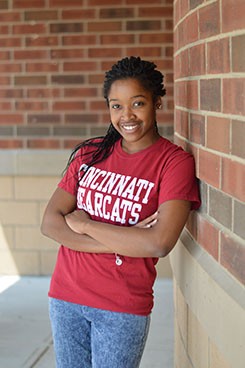
Biomedical Engineering Alumna Receives Stanford Fellowship
Racquel Redwood
,
College of Engineering and Applied Science
12 alumna, recently received the
Biodesign Innovation Fellowship
to
s prestigious
.
Redwood, who also received her masters degree in biomedical engineering from Cornell University (13), was selected based on her experience, passion and innovative drive.
Each year, a new cohort of Biodesign Innovation Fellows learn a project-based approach for identifying important healthcare needs, inventing innovative diagnostics, devices or other health technologies to address them and preparing to bring those products into patient care through start-up, corporate or other implementation channels.
Im honored and excited about the fellowship, stated Redwood. When I received the call from Biodesign, I cried, thanked God and then called my mom.
Redwood developed her product, Pengueeni, alongside classmate, Joel Fladen, during their senior capstone course through the
Medical Device Innovation Entrepreneurship Program
(MDIEP). They worked alongside designers Casey Schneider and Lily DaMota from the UC
College of Design, Architecture, Art and Planning
.
The product is a penguin-shaped finger-lancing device attachment for pediatric diabetics. The devices child-friendly penguin mold vibrates to reduce pain and apprehension in young patients. Redwood states that the product demonstrates her ability to thrive through ambiguity.
I find that navigating Pengueeni is thrilling because there are many unknowns and I am constantly learning, stated Redwood.
She regards some of the highlights of working on the product being; writing and filing the utility patent with the United States Patent and Trademark Office and Patent Cooperation Treaty, organizing an advisory board comprised of experts within pediatric emergency medicine, information technology in healthcare, medical education and intellectual property, recruiting support for market research, collaborating with doctors at Cincinnati Childrens hospital, partnering with the local Cincinnati American Diabetes Association camp and conducting a formative usability investigation with more than seventy-five campers.
Recognition for Pengueeni includes; UC Medical Device Innovation Award, Cincinnati Innovates Award, Innov8 for Health Idea & Business Plan Competition Winner, American Dreamers Podcast and feature in an article in the Cincinnati Business Courier.
Redwood looks forward to the Biodesign program and sees it as a way to further develop her skill-set. She acknowledges that she has much more to learn in order to continue developing Pengueeni and future devices.
I envision positively impacting more people worldwide by creating medical devices that empower the user by incorporating not only ergonomics, but human psychological needs into design, states Redwood.
Related Stories
PHOTOS: 2025 DAAP Fashion Show
May 9, 2025
Over 900 people attended DAAPFASH25, a fashion show that highlights the collections of the fashion design Class of 2025. The show is now in its 72nd year.
UC lab-on-a-chip devices take public health into home
May 8, 2025
University of Cincinnati engineers created a new device to help doctors diagnose depression and anxiety. The “lab-on-a-chip” device measures the stress hormone cortisol from a patient’s saliva. Knowing if a patient has elevated stress hormones can provide useful diagnostic information even if patients do not report feelings of anxiety, stress or depression in a standard mental health questionnaire.
University of Cincinnati announces new leader for prestigious...
May 8, 2025
The University of Cincinnati names Stephanie Pilat, PhD, as the eighth dean of the renowned College of Design, Architecture, Art, and Planning beginning July 1, 2025.
